If you’re an SEO reading this, the point of this article is to communicate this: businesses should hire an SEO consultant/agency to help them out with the full research, guidance around writing things that rank, and promotion. SEOs don’t just insert keywords into articles that are already written.
Often when I am speaking with business owners or marketing managers about SEO and content marketing, I hear some version of this:
We have the industry knowledge, but we need someone to insert the SEO keywords into the articles.
When I hear this I cringe, but it’s understandable. SEO can seem like some magical voodoo that someone on the internet does that all of a sudden gets you a ton of traffic and your business explodes in revenue and you retire early.
Unfortunately, this isn’t how SEO works.
Sorry.
It comes down to a fundamental misunderstanding of how SEO works.
It’s a typical chicken and egg problem – which came first, the knowledge or the topics/keywords?
Table of Contents
How Google has fought low quality “SEO content”
Back in the early 2000s, search engines were stupid. They had no way to know what keywords really meant, but only that they existed. As a result, in the SEO world there became the concept of “keyword density”, which many people practicing SEO used to determine if their page was properly optimized around a specific keyword.
There were also a few other tricks people used to get more instances of their keywords on the page:
- The now-ignored meta keywords tag, which is not seen by users but only by search engine crawlers;
- Making text the same color as the background, so also just visible to search engines but not users;
- Floating text off the screen, once again only visible to search engines in the code but not to users.
As you can tell, these tactics were used to try to game the search engines but added absolutely zero value to the end user. In fact, content that was subpar often ended up ranking over better content because the person “optimizing” the page had better or more tricks up their sleeves.
The search engines found out about these tricks, and for a long time it felt like the search engines and SEO practitioners were in a game of whack-a-mole.
The SEO community would find a new trick that worked (“Ooh, float white text off the screen and it helps!”), the search engines would find out about it and either punish it or devalue it, then the SEO industry would move on the next trick.
Mole, get whacked, pop up again, repeat.
In the last six to seven years however, the search engines have stopped whacking the moles and instead changed the game. And a lot of people in the SEO industry have kept playing checkers while the search engines are playing chess.
A lot of people in the SEO industry have kept playing checkers while the search engines are playing chess.
Google especially has been through a few large shifts in how they rank content and what they reward. The biggest ones related to content and how that maps to your site ranking better have been the following two:
- Panda, starting in early 2011;
- Hummingbird, starting in 2013.
Panda targeted low quality content that was lowering the quality of the search results, especially around “how to” and more informational content. In late 2010/early 2011, if you searched anything trying to find information and directions about it you would probably find some combination of Squidoo, Wikihow, and others ranking. Panda and all of its further iterations until it was rolled into the core algorithm around 2014 started to take care of this problem (image via Sistrix):

Continuing on from there, Google released Hummingbird in 2013 which started the SEO industry talking about “entities” and “topics” instead of keywords. An entity can be anything from a brand to a person, and is most often seen in Google when you find a Knowledge Panel on the right side of a search result:
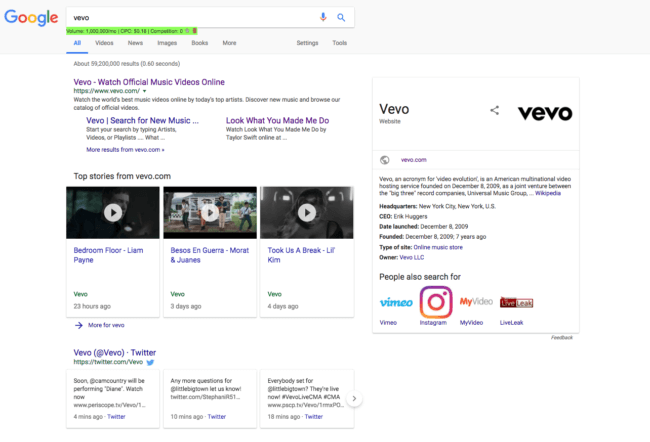
In the above, Vevo is an entity of Google.
In the years since, the search engines seem to have started using at its core something like the tf*idf which “reflect how important a word is to a document in a collection or corpus”, according to Wikipedia.
That’s a fancy way of saying that the search engines are no longer just looking at specific keywords like “SEO consultant’ and how often they are used and match up to other elements on the page (though these things are absolutely still important).
Search engines now know that other terms being used tend to correlate to a more relevant page and better experience for searchers, so they not only look at “SEO” for example but also like to rank pages mentioning SEO better when they also mention things like “content”, “links”, “consultants”, and “Rand Fishkin”. This is just an example, but you see where I am going with this.
Google is rewarding great content
Google has long wanted to reward great content, and I would say that they are finally making great strides in that direction. Certain elements on a page that the SEO industry has found to correlate to better rankings, such as lists and images and blockquotes, are now being used by the search engines in other ways to try to give better results to searchers.
We’ll get to that in a minute, but let’s back up quickly and look at an example of Google rewarding in-depth content with a lot of semantically related terms instead of “properly” optimized content.
Six years ago, the common SEO advice to clients was to put their main keywords in the front of their title tag, in the URL, in their H1 on the page, in their meta description, and a few times throughout the article.
Sounds a lot like “SEO keywords” and “keyword density”, doesn’t it?
Go look at a search result now:
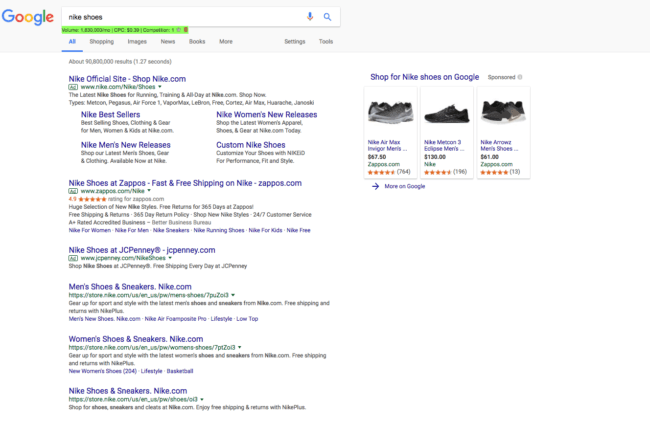
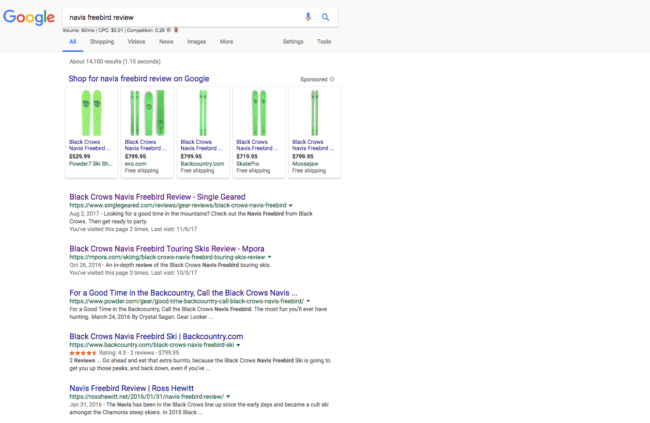
If you look at those two, you definitely still see elements of that old advice, which means that it still works to an extent. But is it enough?
If you look at the Nike example, the first three results are for nike.com! Their brand trumps all, and good luck getting traffic for that broad branded keyword if you are not Nike.com.
The next one is for a pair of skis. At the very top are product ads, but right below that are content sites. I’m not trying to humblebrag here, but that first result is my side project (and yes does rank #1 logged out) and that article is 2,000 words of original content and photos.
Search for an SEO industry related term and you see articles ranking that don’t have the target keyword of [google hummingbird] anywhere near the beginning of the title!
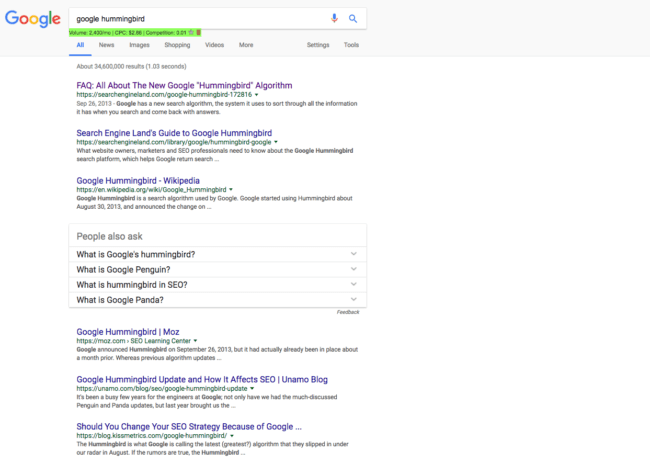
And with the advent of answer boxes in a lot of informational queries, search engines are rewarding well-structured writing that gives the answers that people are searching for.
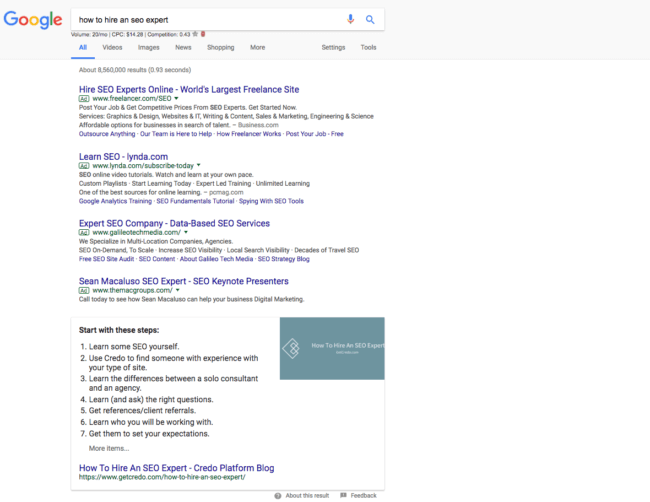
Forget about “SEO keywords”
When someone comes to me wanting to find a consultant to help them with inserting keywords into the content they are writing, I gently help them understand that the days of doing some “SEO tricks” to get content and pages ranking better are long gone and you have to work within the system now to really see the benefits of an SEO investment.
My advice to those looking to hire someone to help them with their SEO is to not treat SEO as something you do after the fact, but rather as a system that needs to be evangelized throughout your organization.
You can’t just write content and then have someone insert some keywords into it.
You actually need the expertise around the topic to write eloquently and naturally about it, because this is what the search engines want.
These days, in order to rank well for a semi-competitive keyword you need a few things:
- Links to the page. This is the strongest ranking factor;
- A semi-authoritative domain;
- Natural language written with semantically related terms in mind;
- To cover the content in-depth.
Brian Dean’s study in 2016 shows that the average #1 ranking for the keywords they studied (over 1 million search results) is 1,890 words according to SEMrush.
The days of 500 word blog posts actually ranking and driving traffic that makes a difference and converts into paying customers is long over. It doesn’t work anymore, so stop paying someone $200 a month to write you four blog posts a month.
“So how long should my content be then, John?” you might be asking. My answer may not surprise you, but I’ll ask you in return:
Well, how much does it take to cover the topic completely?
That’s how long your content needs to be – long enough to cover the topic in-depth and be the best piece of content on the internet about that topic.
So which is first, the research or the expertise?
Where do you start, with the expertise on the topic or with keyword research?
My answer is that to win in the search results (SERPs) these days, you need to be an authority and expert on the topics on which you are writing. This does not mean that you do not ever have to do research in order to write the best piece of content, but it does mean that you cannot just farm out any content to be written on your site to any old “content writer”. You need someone with expertise in the topics in which you are investing.
Once you have the expertise on board, or you are the expert that can then figure out how to get that content written without you spending all of your precious time doing it, then you need to do the keyword research to identify the high-traffic terms that people are searching around your business.
The role keyword research plays in content marketing
We’ve just discussed how you or someone in your company (or at your agency) needs to be a subject matter expert in order to actually rank in the search results these days.
Keyword research will then be much more fruitful because you can identify the keywords and topics that you need to write about in order to get the traffic to your site to then convert into users.
Keyword research comes in from the very beginning so that you can map out your content and systematically create the pages and posts and resources that will meet the searcher, and your potential customer’s, needs.
I’m not going to teach you how to do keyword research in this post, but will rather point you to our resource (linked just to the left) and say that you should consider the following tools when doing your own keyword research for your site/company:
- Adwords keyword tool (still relevant!)
- Moz’s Keyword Explorer
- Google Search Console (a treasure trove of keyword ideas these days)
- Ahrefs and/or SEMrush (depending on which you have a subscription to)
- HitTail or Longtail Pro
Finishing up
SEO isn’t easy, but it is also very learnable. It is a system that you can learn and execute within and see repeatable and dependable growth and results as long as you take the needed action and apply the tactics and strategies that you learn.
Start with becoming an expert, layer on proper keyword research and topic discovery and development, and then go execute and dominate your niche.
Have fun!

